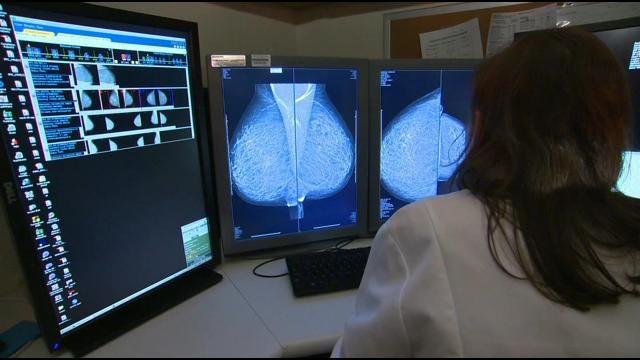Berryhill Woman Says Double Mastectomy Decision Was Right For Her
Angelina Jolie's announcement Tuesday about her decision to have a double mastectomy, after learning she was at high risk of developing breast cancer, has women and doctors expressing their opinions.Tuesday, May 14th 2013, 6:07 pm
Angelina Jolie's announcement Tuesday about her decision to have a double mastectomy, after learning she was at high risk of developing breast cancer, has women and doctors expressing their opinions.
It is an intensely personal decision--should a woman have her breasts removed to keep from getting cancer?
One Berryhill woman I spoke with said there is simply no other answer than, "Yes."
"I don't live in fear every six months, when I go to the doctor, that they'll find another lump," Debbie Miles said.
She had both of her breasts removed eight years ago and she said it hasn't held her back.
"I wear swimsuits, I wear tank tops, I wear evening gowns," Miles said.
The surgery came after her mother and aunt died of breast cancer, her sister was diagnosed with the disease, and Miles herself had several lumps removed from her breasts.
She said it's a decision she has never regretted.
"My children don't have to see me die of breast cancer, like I saw my mother die," Miles said.
5/14/2013 Related Story: Angelina Jolie Says She Had Double Mastectomy
Angelina Jolie has shined her celebrity spotlight on preventative measures for breast and ovarian cancer. She had both of her breasts removed after a genetic test showed her chances of getting either of those cancers were extremely high. The test showed she had an abnormality in the BRCA gene.
Geneticists say that abnormality increases a woman's chances of getting breast cancer to 85 percent. For ovarian cancer, it's 45 percent.
One-in-1,000 people are affected by this abnormality, but that risk is much greater in the Jewish population, where one-in-60 people are affected.
Doctors say the test is easy to take, but patients need to have a plan for what to do with the results.
"Know the information, know what you're going to do with the information before you decide to do testing, and then be prepared for what the results might be," said clinical geneticist Dr. Michael Kayser.
And Miles says, "You have to get over being Barbie."
She said she never took the test, but encourages women who have a family history of breast cancer to get it done.
If it shows you're at risk, Miles encourages women to seriously consider a preventative mastectomy.
"If you test positive and you do not have this done, you are signing your death warrant," Miles said. "You're basically committing suicide by breast cancer, and it's going to be a long, ugly one.
The test costs $4,000 to administer, but it may be covered by your insurance.
State and federal laws prevent your employer or health insurance from using information from a genetic test to determine your insurance rates or job status.
More Like This
September 29th, 2024
September 17th, 2024
Top Headlines
December 13th, 2024
December 13th, 2024
December 13th, 2024
December 13th, 2024













